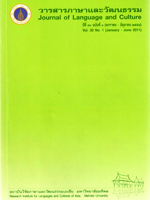Quality assessment of community translation in Japanese context: Functionalist approaches
Main Article Content
Abstract
This paper attempts to assess community translation texts in the Japanese context using functionalist approaches. The texts, which contain information on emergencies and an individual’s rights, were translated from Japanese into Thai and English in terms of Vermeer’s skopos theory. The assessment framework consists of adequacy for the translation’s skopos (purpose), internal coherence within the target language, and fidelity to the source language. Results of the analysis indicate that there were differences in quantity and quality of translated information between the two target languages. Some translated texts, in which focus was placed on the form of the text in the interlinear sense, maintained a style of consecutive translation, which, as a result, led to a failure in coherence within the target text. However, those texts managed to achieve adequacy regarding the translation’s skopos. These results indicate that it is also necessary to consider non-text factors, such as the consistency of information in the target language and timeliness of the translation, in order to adapt the assessment framework for community translation.
Article Details
How to Cite
Yamamoto, K. (2014). Quality assessment of community translation in Japanese context: Functionalist approaches. Journal of Language and Culture, 30(1), 99. retrieved from https://so03.tci-thaijo.org/index.php/JLC/article/view/20252
Section
Research Articles
The articles featured in the Journal of Language and Culture (JLC) constitute academic works representing the viewpoints of the respective author(s). It is crucial to note that these opinions do not necessarily reflect those of the Editorial Board.
All articles published in JLC are released under the Creative Commons Attribution 4.0 International License (CC BY 4.0). This license grants permission for unrestricted use, distribution, and reproduction in any medium, provided proper credit is given to the original author(s) and the source.


